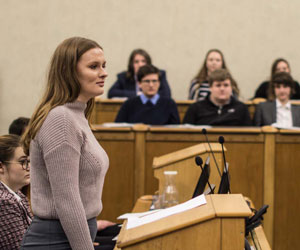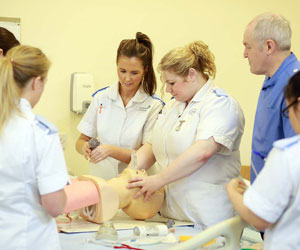The programme is available from PgC to MSc and meets the immediate demand for higher level skills development of graduates in engineering organisations. To further enhance programme relevance, industrial experts will co-deliver the programme alongside our own academic staff. Modules will be delivered by a combination of online learning and face-to-face delivery with 3 days of scheduled face-to-face delivery for each module, typically delivered as 2+1 day blocks.
This programme was co-created with industry & meets the immediate demand for higher-level skills development of graduates in industry. The focus of the programme is the continuous development of 5 key competencies identified by employers as being core characteristics and behaviours of effective leaders and manager, namely: Leadership Behaviours, Management, Commercial, Interpersonal Skill, & Innovation. Delivery has been designed for this programme to support practitioners in the world of work.
Graduate destinations
On completion, you'll be prepared for positions of increased responsibility enabling you to lead in innovative, responsive business settings. Skills developed are identified by industry as underpinning for effective leaders & managers. Chartered Engineer, CMI Chartered Manager or Institute of Leadership Management Member/Fellow status is possible. Participants may also continue to PhD.
Early exit awards include:
- PgC Organisational Leadership (60 credits)
- PgD Industrial Leadership: Engineering (120 credits)
Course outline
Course summary
The programme is available for students from September 2019, from PgC to MSc, and meets the immediate demand for higher level skills development of graduates in engineering organisations.
Modules
Year 1 (PgCert Industrial Leadership Modules)
|
Year 2 (PgD Industrial Leadership: Engineering)
|
Year 3 (MSc Industrial Leadership: Engineering)
The module will consist of three elements: Project business case & plan: Outline literature review, problem definition, options appraisal & business case. To be presented to Industry & UoC Panel for approval before research commences. Dissertation: Industrial research and project report. Chosen research to be taken in workplace under supervised by course team. Oral Assessment & Presentation: The industrial research project will be assessed using a viva & poster presentation. |
Programme Specification
For a detailed summary of all course content please read our programme specification for this course.
Assessment, Feedback, and Teaching and Learning methods
Full details are available in the programme specification.
Timetables
The teaching timetable should be available from the end of August. Access to the timetable is through the Student Hub – you will be able to access the Student Hub after you have completed online registration. The teaching day is 9am to 6pm, Monday to Friday; please keep your other commitments open until confirmation of your teaching timetable, and bear in mind that many courses will offer placements or fieldwork which sometimes extends into the evenings and weekends.
Entry requirements
Have a question about our entry requirements?
Entry Requirements
1st or 2nd class honours degree.
Students with other qualifications may be admitted to the course, please contact the Enquiry Centre for further details.
Accreditation of Prior Learning (APL) may be considered for relevant prior learning at the same academic level.
More information about levels and credits.
Selection criteria
Non UK degree candidates must be working at team leader or equivalent in industry. Naric database to inform equivalence to UK honours degree.
Applicants with non-standard qualifications but substantial engineering experience may be invited to interview to present their portfolio of experience.
If an applicant’s first language is not English, English Language test to level of IELTS 6.5 (min 5.5 for each band) is required, or the UoC English assessment programme prior to joining the programme.
Application information
Making your application
Applications should be made online directly to the university - visit our website or contact enquirycentre@cumbria.ac.uk for details and guidance. There is no official closing date but we would encourage you to apply as early as possible, as many courses are competitive.
What makes a good application?
We consider all aspects of your application, not simply your qualifications and grades. We look at your academic background and performance, relevant experience (particularly for professional courses where some voluntary or paid experience is required) and your reference. Above all, we look for motivation, commitment and potential - evidence that you can benefit from study at higher education level.
Make sure you include:
- Relevant qualifications/evidence of ability: check our website for the specific entry requirements required for each course. Tell us your previous academic results and your projected grades.
- A supportive reference, from an employer or your school or college.
- A good personal statement.
Explain clearly what attracts you to the course and tell us about your wider interests and experience. If you are applying for a course that incorporates professional training and placements, you should include any relevant experience or visits you have made in the workplace. Highlight your individual strengths and qualities, personal skills, capacity for teamwork, contribution to the community and your enterprise, originality and determination. Select some activities which bring out these qualities.
What next?
When we receive your application, we will send you an acknowledgement and if you are successful at this stage you will get either - an offer (with an invitation to visit the campus to which you have applied), or - an invitation to interview on a particular date. If we are not able to offer you a place on your chosen course we will usually try to offer you a place on a similar course and will contact you to discuss this. Alternatively, if we think you are suitable, but cannot offer you a place on your preferred campus because of the level of competition, we will offer you a place at another campus if one is available.
And if I accept?
The admissions team will contact you and send further information from February onwards about accommodation, and from May/June onwards about preparing to join the university. If you have any other queries, please telephone the admissions offices for information and advice on 0845 6061144.
Deferred entry
We welcome applications for deferred entry on some courses. If you have specific plans during your year out, indicate these on your personal statement as they may be relevant to your course and could enhance your application.
International students
Please see the international pages of our website for full details of our entry requirements (including English-language skills) as well as contacts for advice and support.
From 2009 the UK Border Agency introduced a Points-Based Immigration System (PBS) for students coming to the UK from outside the European Economic Area (EEA).
Students entering higher education will need to obtain a Confirmation of Acceptance (CAS) plus finance confirmation to obtain a Tier 4 student visa.
UK education providers are licensed by the UK Border Agency. When students apply for their visa (or entry clearance) they will need a valid Certificate of Acceptance of Studies from the university. Please note that a CAS is not a guarantee that a visa will be issued.
See the following websites for further details:
Student finance
We have a wide range of scholarships, bursaries, grants and funds available to support you throughout your studies with us. This includes the Cumbria Bursary - a non-repayable bursary designed to support first year students with a household income of less than £25,000..
Student FinanceResources and Facilities
- Preparing for Postgraduate Study: Free online pre-entry Master’s level course/induction via PebblePad VLE.
- Personal Tutoring: Personal Tutor allocated.
- Personal Development Planning: via use of reflective professional portfolio developmental tool.
- Library & Academic Support: via discovery tool OneSearch.
- IT & Technical Support: Student Hub, & IT Service Desk support.
- Student Services: Careers/employability, financial help, counselling, health/wellbeing, support for disabled students & specific learning needs.
- Career Ahead: UoC's Employability Award making your CV stand out.






